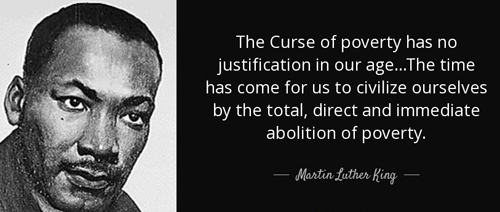Education for All: Backing the Wrong Horse... House bill 'a colossal mistake...'
 HR 4481 calls itself the "Education for All" bill, but it is really a billion dollar gift to corporations who do standardized testing. Dr. King said over and over that education is not the path out of poverty -- that you had to cure poverty in order to make education more possible for all children.The US House of Representatives quietly passed HR 4481 on September 7, the "Education for All" act. HR 4481 has rarely been mentioned in the media, and news of the House's action appeared only in a few congratulatory tweets. I try to keep up with news in education, but I learned about 4481 the day of the House vote.
HR 4481 calls itself the "Education for All" bill, but it is really a billion dollar gift to corporations who do standardized testing. Dr. King said over and over that education is not the path out of poverty -- that you had to cure poverty in order to make education more possible for all children.The US House of Representatives quietly passed HR 4481 on September 7, the "Education for All" act. HR 4481 has rarely been mentioned in the media, and news of the House's action appeared only in a few congratulatory tweets. I try to keep up with news in education, but I learned about 4481 the day of the House vote.
Despite its noble goals, "Education for All" is a colossal mistake.
The description sounds wonderful: "... to provide assistance for developing countries to promote quality basic education and to establish the goal of all children in school and learning as an objective of the United States foreign assistance policy, and for other purposes."
But the premise is wrong, the approach has not worked in the US, and the new law would only benefit the oligarchy, the .01% who control the testing industry.
The Premise
HR 4481 assumes education is the driving force behind economic growth, reduction of poverty and inequality. There is another point of view, clearly expressed by Martin Luther King in 1967: "We are likely to find that the problems of housing and education, instead of preceding the elimination of poverty, will themselves be affected if poverty is first abolished."
In other words, 4481 says "improve education and this will reduce poverty and improve the economy." In contrast, Dr.King said, "reduce poverty, and this will result in improved educational achievement."
There is strong evidence that Dr. King was right. Research done with countries, states, and individuals consistently shows that high levels of poverty are associated with low school achievement. There are good reasons for this: Among other things, poverty means food deprivation, lack of health care and lack of access to books, each of which has a devastating impact on school performance. The best teaching in the world will have little effect if students are hungry, ill, and have little or nothing to read. There is also consistent evidence that when children of poverty are provided with improved nutrition, health care, and access to books, school performance improves.
No Child Left Untested
"Education for All" really means "Testing for All." It calls for "rigorous" monitoring and evaluation, not just in school subjects but also in "critical thinking and civic education." This will cost billions in terms of test development, piloting, and research, especially in areas where evaluation has not been well investigated (e.g. critical thinking and civic education). The tests will need to be constantly revised, and the technological demands will be enormous, with expensive new technology added as computer science makes more "progress." The US has followed this path with no significant improvement in achievement, a result that is no surprise to those who have read the research. The only winners have been the testing companies.
Rather than spend billions on testing, we should invest in protecting children from the effects of poverty.
For the amount of money HR 4481 proposes to spend on evaluation, children all over the world could be significantly better fed, have better health care, and improved school libraries, which will improve school performance and the quality of life for millions.
The bill now goes tto the Senate. I hope our senators will be better informed than members of the House of Representatives.
Sources:
'… the problems of housing and education…:": King, ML,1967. Final Words of Advice. http://www.wealthandwant.com/docs/King_Where.htm.
...high levels of poverty are associated with low school achievement: White, K. 1982. The relationship between socioeconomic status and academic achievement. Psychological Bulletin 91(46), 461-81; Tienken, C. 2014. Poverty and test performance. Kappa Delta Pi Record 50: 106-108.
…poverty means: Berliner, D. 2009. Poverty and Potential: Out-of-School Factors and School Success. Boulder and Tempe: Education and the Public Interest Center & Education Policy Research Unit. http:// epicpolicy.org/publication/poverty-and-potential; Krashen, S. 1997. Bridging inequity with books. Educational Leadership 55(4): 18-22.
... school performance improves: FRAC, 2014. Breakfast for Learning. Food Research and Action Center; Healthy Schools Campaign, 2014; Research Shows Full-time School Nurses Improve Student Health and Learning; Lance, K. 2004. The impact of school library media centers on academic achievement. In Carol Kuhlthau (Ed.), School Library Media Annual. 188-197. Westport, CT: Libraries Unlimited. (For access to the many Lance studies done in individual states, as well as studies done by others at the state level, see http://www.davidvl.org/research.html); Krashen, S., Lee, S.Y. and McQuillan, J. 2012. Is the library important? Multivariate studies at the national and international level. Journal of Language and Literacy Education, 8(1): 26-36.)
.... no surprise ....:: Nichols, S., Glass, G., and Berliner, D. 2006. High-stakes testing and student achievement: Does accountability increase student learning? Education Policy Archives 14(1). http://epaa.asu.edu/epaa/v14n1/.

